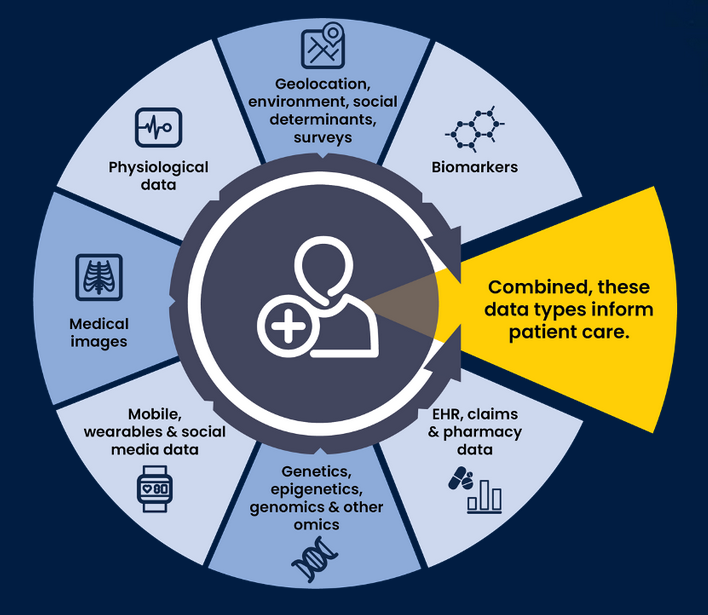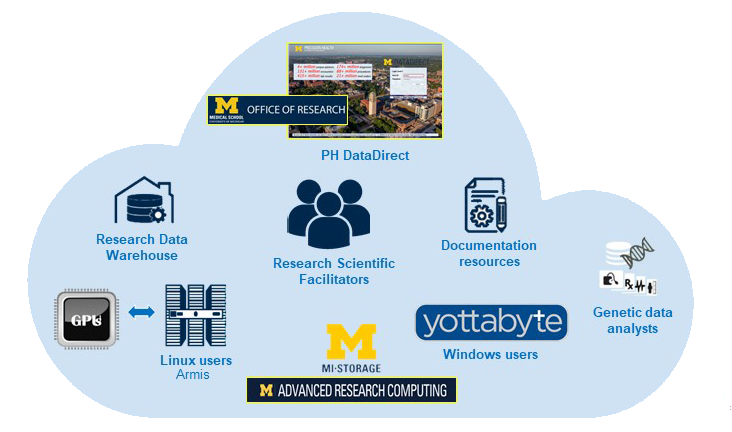
The University of Michigan has created an initiative to connect health related data resources and state-of-the art analytic tools known as Precision Health. Precision Health aims to advance medical research at the University of Michigan. They use a number of different data sets to conduct this research, and combine these to better inform patient care.
One such data set is from the Michigan Genomics Initiative. The MGI combines a patient’s electronic health data and genetic data in order to gain biomedical insight. In order to gather this data, the patients are allowed to opt in to be part of the study and provide either saliva or blood to give a genetic sample. The initial recruitment for this started in 2012 and continues today. Over the years, there have been over 10 partnered MGI studies and 95,000 consented MGI participants with an estimated growth of 10,000 participants per year going forward. Of these 95,000 participants, 80,000 have been genotyped, 500 have had Whole Exome Sequencing, and 1,000 have had targeted sequencing.

Michigan Medicine has also gathered de-identified clinical data on 5 million unique patients. Included in this data is longitudinal data as it relates to lab results, medications, procedures, outcomes, and vital signs dating back as far as 2002. Researchers are also able to get information about these patients’ locations and socioeconomic status to factor in data such as the Neighborhood Disadvantage Index to figure out more about their health. They can also get imaging data from these patients, including chest x-rays and brain MRIs.
Another set of data available through Precision Health is survey data. Through survey data, researchers are able to see information on pain questionnaires, epidemiological outcomes, and a COVID-19 survey. These questionnaires touch on topics such as overall body pain, life satisfaction, diet, vision, hospitalization, education level, and more.
The MGI cohort also allows Precision Health access to studies they’re doing related to mobile fitness devices. One such study is called the PROMPT study. PROMPT stands for PROviding Mental health Precision Treatment. Another study is called the MiPACT study, which stands for Michigan Predictive Activities and Clinical Trajectories. These studies monitor things such as participants’ activities, their blood pressure, their weight, their heart rate, and more.
Researchers also have access to information about COVID-19 related information about patients through the Michigan Medicine cohort. This sort of information includes those who have tested positive for COVID-19, who have received the COVID-19 vaccine, cord blood testing in patients who were positive for COVID-19, and more.

This study uses a HIPAA-aligned computing environment that is owned by Precision Health. To get access to the data sets, you’re required to complete a number of steps. You must have University of Michigan credentials, sign up for DUO authentication, complete HIPAA training, get certified in PEERRS Human Subject Research Protection, sign and complete data attestation, have a Precision Health Membership, and if you’re looking into patient data, you must complete eResearch application through IRBMED.

Precision Health is funded by Michigan Medicine, the College of Engineering, the School of Public Health, and the Office of the Provost. Precision Health is run by three co-directors – Brahmajee Nallamothu, Jenna Wiens, and Sebastian Zöllner. Also involved are Katherine Moran who deals with research facilitation, and Emily Bertucci-Richter and Brett Vanderweff who deal with genetic data analysis. To learn more visit their website or send them an email at PHmembership@umich.edu.




